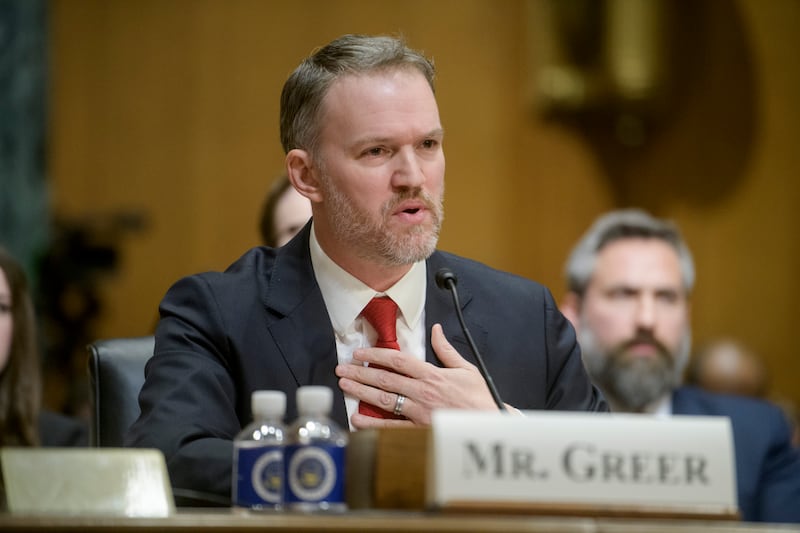On Thursday, Jamieson Greer, President Donald Trump’s pick for trade representative, defended the White House’s recent move to impose tariffs on three major countries: Mexico, Canada and China.
Greer, who was the chief of staff for former U.S. Trade Representative Robert Lighthizer, told the Senate Finance Committee in his opening remarks that he believes “America should be a country of producers.”
He spoke about his upbringing in northern California, tying it to his vision for this position. “Our family lived in a mobile home, and my parents ... regularly worked several jobs to help make ends meet, and the children helped,” Greer said in his opening remarks.
“I’m very mindful of the struggles that Americans face when they’re cut out of economic growth,” he said. “And trade plays a role in those concerns.”
Greer said he is convinced that the U.S. has “a relatively short window of time to restructure the international trading system” to better serve American needs.
Greer spoke in measured tones as he tried to give senators reassurance amid Trump’s threats of new tariffs. He repeatedly said he would be open to feedback from Congress as well as from average Americans facing problems because of any active trade policies.
The lawmakers voiced concerns from their constituents over worries of rising prices in the U.S.
Should he be confirmed, Greer, a lawyer and a Brigham Young University graduate, will step into one of the most high-stakes positions in the Trump administration, as the Deseret News previously reported.
On Saturday, the White House announced its plan to impose a 25% tariffs on goods from Mexico and Canada and 10% tariffs on goods imported from China. The plan also included a 10% tariff on energy resources from Canada. But before these orders could take effect, both Mexico and Canada made pledges to help the U.S. in reducing the flow of fentanyl and better policing their borders in exchange for a 30-day extension on the tariffs.
In his opening remarks, Greer said his goal is to “level the playing field” for American producers.
Senate Finance Committee chairman Mike Crapo, R-Idaho, drew Greer’s concern to the agriculture in the west. “Idaho’s 24,000 farms and ranches produce 185 commodities, and Idaho leads the nation in potato, barley and hay production, and is the third-largest producer of milk and cheese.”
Despite any notable growth, these products haven’t entered “any new markets in the last four years,” said Crapo. “Farmers are also concerned that they may become the target of retaliation if we use tariffs to pressure other countries to change their ways. How will you support the interests of America’s farmers and ranchers once you’re confirmed as our nation’s chief trade negotiator?”
Greer said he is familiar with the agriculture industry in Northern California — known for its rice, fruit and almond production — as well as in the northwest and the Mountain West.
He agreed that the U.S. needs to gain more access to global markets and said it has the tools at its disposal to make that happen.
“For many decades, we have had a trading system where the United States opens its market over and over again, and others do not,” Greer said. “In India, for example, their average inbound tariff rate on agricultural products is 39%. In Turkey, it’s 39.8%.”
Dems warn against potential of trade war
Sen. Maria Cantwell, D-Wash., ran out of time before she could ask a single question, but she raised a few points of concern.
According to her, pre-pandemic, a majority of the world population were a part of the middle class, which is why she supported an “aggressive trade strategy.”
“I get that you work for a guy who thinks that you throw down the tariffs and you force something, some little deal out of China, when I’m saying I want an aggressive continuation of U.S. policy over decades and decades and decades,” she clarified.
Cantwell argued the Trump White House’s tariffs are targeting the biggest markets that are already open to the U.S.
Instead of potentially sparking a trade war that drags on half a decade, the Trump administration should craft better trade relationships with new and potential markets, like India, she said.
“In this tariff war, when we lose, it’s not that you won’t have farmland, it’s just that it’ll be owned by some corporation like Goldman Sachs or Bill Gates,” the Washington senator said. “We can’t bail them out with taxpayer dollars.”


